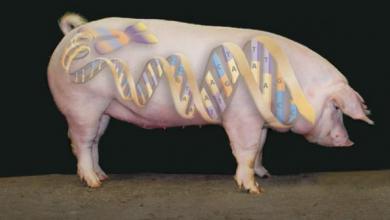
What can knowing the sequence of all the DNA in pigs tell us about human diseases? Plenty, says Lawrence Schook. He heads an international consortium to sequence the pig genome that is announcing its results Monday at the Wellcome Trust Sanger Institute in Hinxton, England.
"The pig, I think, is going to allow us to have some really great opportunities to looking at physiology and behavior and disease relationships that afflict humans much more than any other species that has been sequenced to date," Schook says.
That's because pigs share many important physiological traits with humans, and can be more easily studied than non-human primates such as apes or monkeys.
The sequencing project cost about $24 million, approximately half of which was contributed by the U.S. Department of Agriculture.
TJ Tabasco
The sequence comes from a single pig, formally known as UIUC 2-14, although she's also called TJ Tabasco. She's a Duroc pig, one of five major breeds used in pork production around the world.
Schook says having the sequence of a domesticated pig will help scientists learn how domesticated pigs diverged from their wild cousins.
"We can begin to look at regions of the genome that contribute to behavior and disease resistance by looking at the native wild animals, in contrast to the highly selected modern breeds that we see today," he says.
There haven't been any major surprises revealed by the pig genome so far, but Schook says there was one finding that was unexpected:
"The structure of the genome, as well as the sequence of the genome and the similarities with humans, was much higher than we had anticipated," he says.
Read the original article here.
